Understanding Your Options for Cost-Free Addiction Treatment
Recovery from addiction is a critical step towards a healthier life, but the cost of rehab services can be a significant barrier for many. Fortunately, numerous programs across the country offer free or low-cost treatment options. This comprehensive guide explores how to access free drug and alcohol rehab, who qualifies, and the resources available to those seeking help without financial strain.
Do You Have to Pay for Rehab?
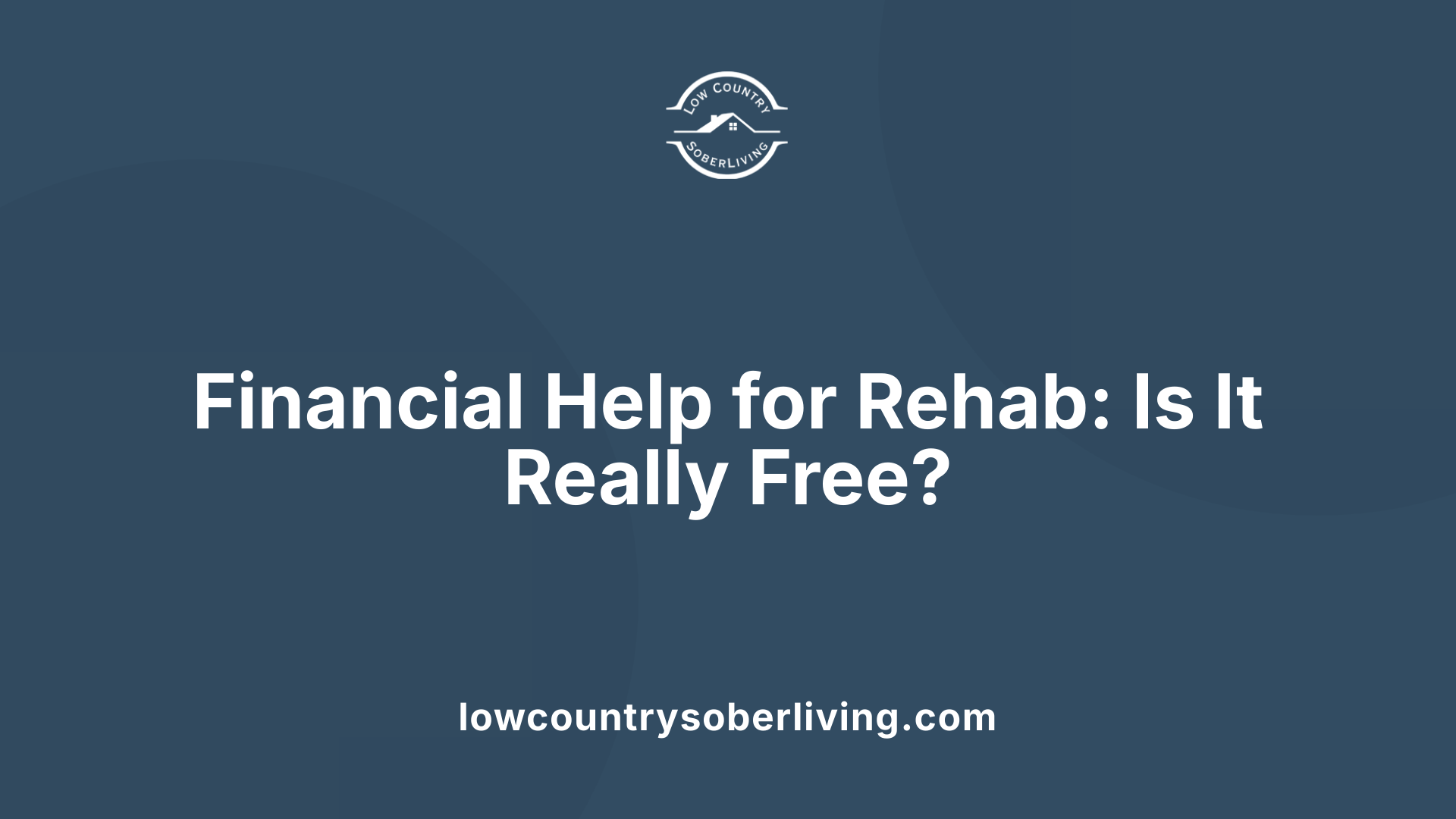
Do you have to pay for rehab?
Whether you need to pay for rehab depends on many factors, including your financial situation and available resources.
Many treatment facilities accept insurance plans like Medicaid and Medicare, which can cover part or all of the costs. Medicaid is available for low-income individuals, while Medicare usually helps those over 65 or with disabilities.
In addition to insurance, there are free or low-cost options through nonprofit organizations, government-funded programs, and community resources. These often include sliding scale fees based on income or full scholarships for those who cannot afford treatment.
The costs of rehab can vary greatly. Options range from completely free programs funded by government or donations to luxury inpatient centers that charge tens of thousands of dollars for a longer stay.
In summary, while some rehabilitation treatments involve expenses, many affordable and free options exist. Assistance programs, insurance coverage, and charitable funding help make recovery accessible for many people.
Range of costs from free to expensive
| Type of Rehab | Typical Cost | Details |
|---|---|---|
| Free programs | $0 | Funded by government, charities, or community donations |
| Outpatient rehab | $1,000 to $10,000 | Varies based on program length and intensity |
| Inpatient rehab | $5,000 to over $80,000 | Longer and luxury programs tend to cost more |
| Detox services | $250 to $800 per day | Depending on outpatient or inpatient setting |
Many treatment options are designed to be affordable or free, especially for those in need, ensuring that everyone has access to the help they require.
Types of Free Rehab Programs Available
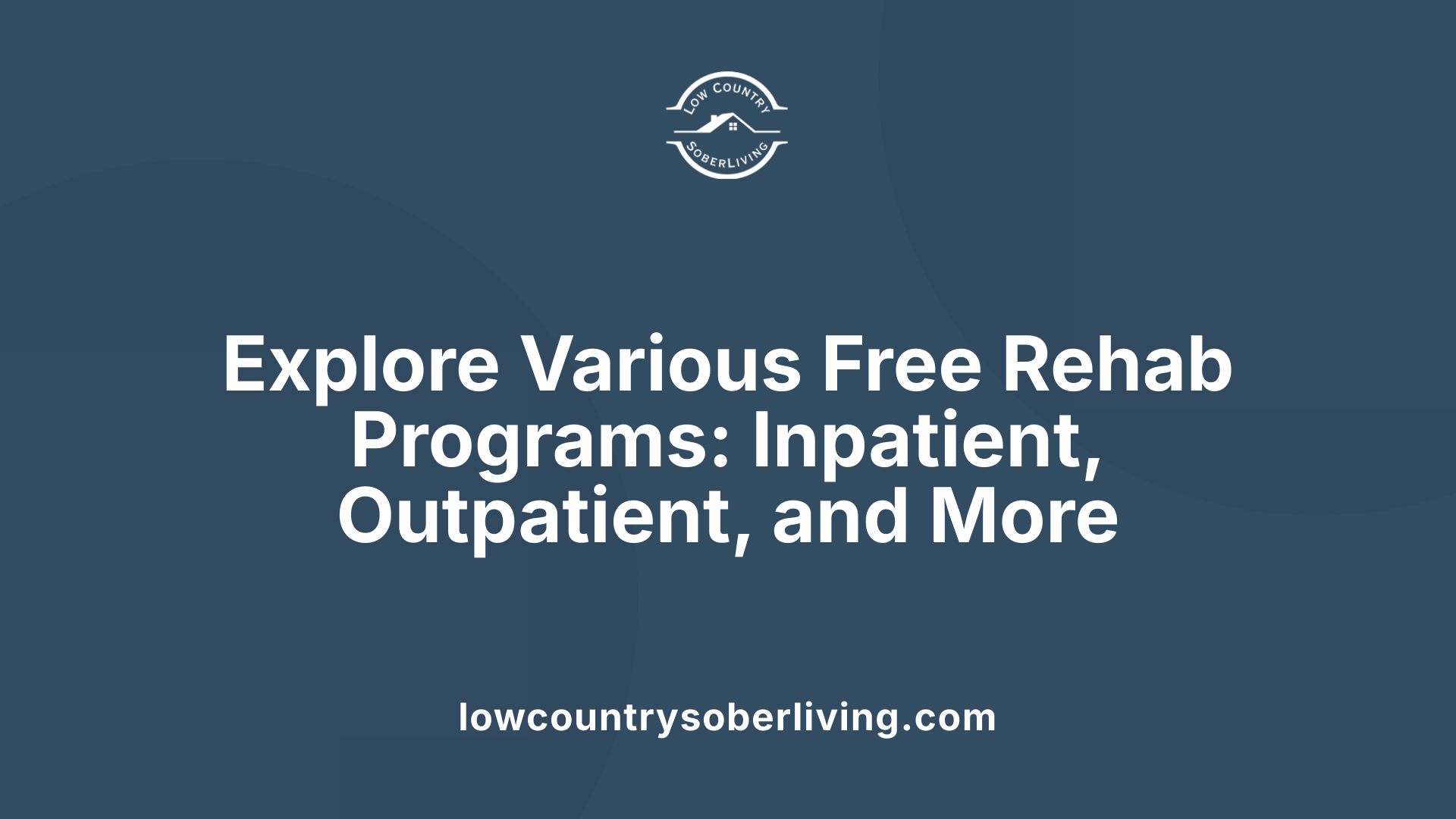
What types of free rehab programs are available?
Free rehabilitation options are accessible through a mix of government-funded initiatives, nonprofit organizations, faith-based groups, and community programs. These services aim to provide comprehensive treatment tailored to individuals’ needs, including inpatient, outpatient, detox, and medication-assisted options.
Government agencies, such as the Substance Abuse and Mental Health Services Administration (SAMHSA), offer resources, helplines, and directories to locate local free or low-cost treatment facilities. Many of these centers serve vulnerable populations such as pregnant women, low-income families, and individuals without insurance.
Nonprofit and faith-based organizations also run their own programs, often incorporating spiritual guidance with recovery efforts. Organizations like the Salvation Army and Christian Recovery Centers provide inpatient and outpatient services funded through donations and grants.
Community resources and online platforms are valuable for connecting individuals to available free services. These include local health departments, online treatment locators, community clinics, and support groups that provide ongoing treatment, counseling, and peer support.
Treatment modalities vary based on the severity of addiction. Inpatient programs offer a structured environment with medical detox and intensive therapy. Outpatient programs are suitable for mild to moderate addictions, providing flexibility while still delivering counseling, medication-assisted treatment, and relapse prevention.
Overall, free rehab services are crucial in expanding access to addiction treatment, especially for those facing financial challenges. Eligibility often depends on income, residency, and social factors, with priority given to populations in greatest need.
Eligibility Criteria for Free Rehab Programs
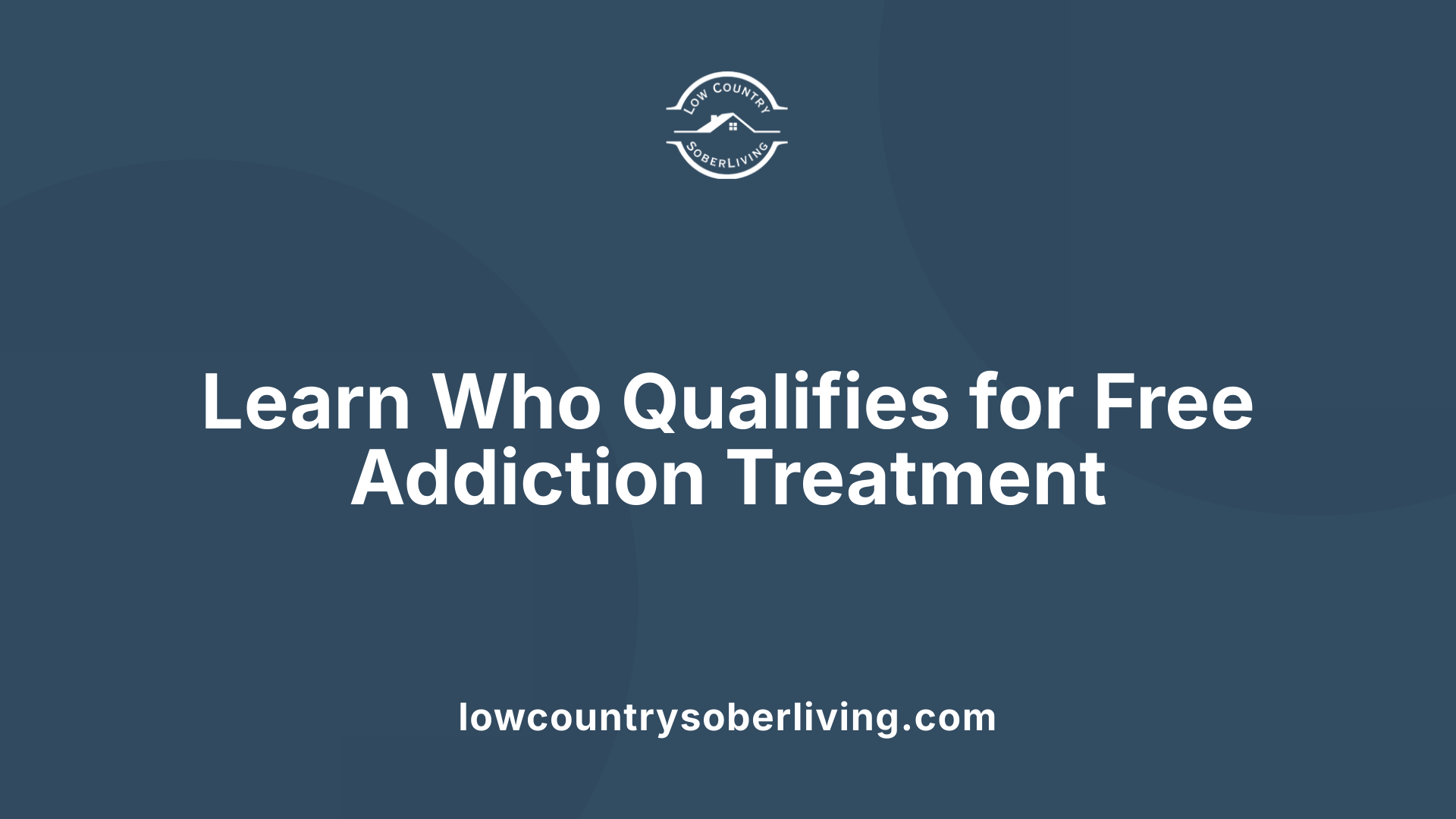 What are the eligibility criteria for free rehab programs? Most free or low-cost rehab services require applicants to meet certain qualifications. Typically, these include proof of income demonstrating financial need, verification of residency within a specific state or community, and proof of legal residence in the U.S.
What are the eligibility criteria for free rehab programs? Most free or low-cost rehab services require applicants to meet certain qualifications. Typically, these include proof of income demonstrating financial need, verification of residency within a specific state or community, and proof of legal residence in the U.S.
Many programs prioritize individuals with low income, those without insurance, or those who belong to special populations such as pregnant women, veterans, or individuals involved with child protective services. For example, Medicaid and Apple Health recipients often automatically qualify for treatment services.
Applicants often need to provide documentation such as pay stubs, tax returns, or other proof of income. Residency proof could include utility bills, lease agreements, or state ID. For veterans, the VA offers free treatment options if they meet service and enrollment criteria, with additional coverage based on benefit status.
Funding sources, including government grants, Medicaid, and charitable donations, enable these programs to operate. These organizations usually require applicants to verify citizenship or legal residency and sometimes their level of addiction severity.
In summary, eligibility mainly centers around financial hardship, residency, insurance status, and specific population requirements, ensuring that available resources reach those most in need.
For more detailed information, search using phrases like "Eligibility for free drug rehab." Various platforms and local agencies provide assessments to determine if you qualify based on these criteria.
Resources for Accessing Free Addiction Treatment
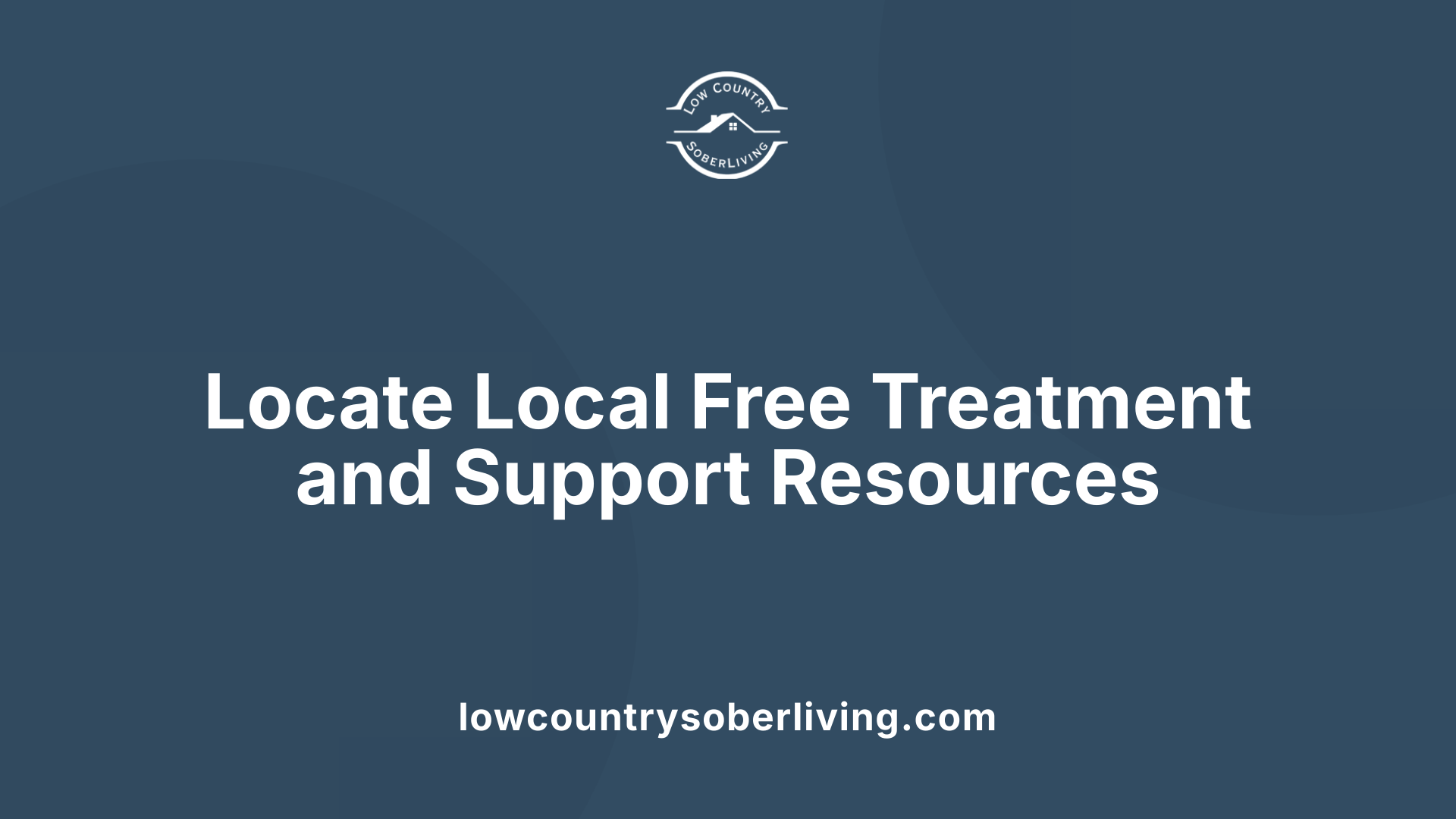 Finding help for addiction doesn’t have to come with a high cost. There are many resources available for those seeking free or low-cost treatment options.
Finding help for addiction doesn’t have to come with a high cost. There are many resources available for those seeking free or low-cost treatment options.
One of the most important starting points is federal helplines like SAMHSA’s National Helpline. This free, confidential 24/7 service offers treatment referrals and information in English and Spanish, connecting callers to local treatment facilities, support groups, and community-based organizations.
Online directories such as FindTreatment.gov are valuable tools for locating local free or low-cost addiction programs. These websites keep updated listings of facilities and services, often including options for inpatient, outpatient, detox, and medication-assisted treatment, especially tailored for low-income individuals, veterans, and specific populations.
State-funded programs and local health centers also play a crucial role. Many states operate public mental health or substance misuse treatment centers that provide affordable or free services. Eligibility often depends on income, residency, or military status, and services include outpatient counseling, inpatient rehab, and medication management.
Non-profit organizations and faith-based groups are key resources as well. Faith-based initiatives, such as those run by the Salvation Army or local churches, offer free outpatient and inpatient programs often integrating spiritual support alongside addiction treatment.
Community support groups, online recovery communities, and initiatives supported by organizations like the Department of Veterans Affairs (VA) provide additional avenues for assistance. These programs range from peer-led support groups to structured therapy and can be accessed at little to no cost.
In summary, through federal helplines, online tools, state and community-funded centers, and faith-based initiatives, individuals can find comprehensive addiction treatment services without financial strain. Exploring these options with the help of available resources can significantly improve access to recovery and support.
How to Access Free Drug and Alcohol Rehab Services
If you're seeking help for substance use issues without the financial burden, several resources are available to guide you through free or low-cost treatment options.
One of the most accessible starting points is SAMHSA’s National Helpline, reachable at 1-800-662-HELP (4357). This confidential, free service operates 24/7 and provides immediate referrals to local treatment centers, support groups, and community organizations. It communicates in both English and Spanish and can assist you in locating nearby services by phone, online locator, or even text message using your ZIP code.
Many states also have dedicated programs funded by public funds aimed at supporting low-income individuals with addiction treatment. These include outpatient and residential care, medication-assisted treatment, and support services, often available without insurance or requiring proof of income and residency.
For those covered by Medicaid or eligible for VA benefits, treatment costs can be significantly reduced or fully covered. Medicaid typically pays for a wide range of addiction services, while VA benefits support veterans and active military personnel through inpatient, outpatient, and medication-assisted programs.
Community clinics and organizations like The Salvation Army, faith-based groups, and nonprofit health centers also run free or sliding-scale fee programs. These centers often provide comprehensive care including detox, counseling, and support groups, especially for underserved populations.
Utilizing online tools and local community initiatives can further help locate and access these services. Websites like FindTreatment.gov and community health directories are valuable resources that compile available free programs.
In summary, accessing free treatment involves reaching out through SAMHSA’s helpline, exploring state-funded programs, leveraging insurance benefits if available, and connecting with local community organizations and online resources. These options ensure that anyone seeking help can find the support they need, regardless of financial situation.
For more detailed guidance, searching for ‘How to find free addiction treatment’ online will yield numerous local and national resources tailored to your needs.
Free Rehab Services for Specific Groups: Veterans and Others
Are free rehab services available for specific groups like veterans?
Yes, a variety of free rehab services are accessible for groups such as veterans. The Department of Veterans Affairs (VA) offers numerous treatment options, including inpatient and outpatient care, medication-assisted treatment, detox, and counseling, often at no cost for eligible veterans.
Beyond VA programs, community Vet Centers provide free private counseling, assessments, and support services dedicated to helping veterans with substance use issues. These services are available even if veterans do not qualify for VA benefits.
Many state-funded programs also aim to serve low-income individuals, including veterans, offering free or reduced-cost addiction treatment. Additionally, faith-based organizations like the Salvation Army operate free programs that support those in need. These organizations focus on integrating spiritual support with recovery, broadening access for eligible populations.
Furthermore, insurance use is flexible in many cases, with coverage through Medicaid or private insurance often helping to offset treatment costs. This broad network of options ensures that veterans and other priority groups can find accessible, effective recovery services without the financial burden.
Are Free Drug and Alcohol Rehab Services Truly Available?
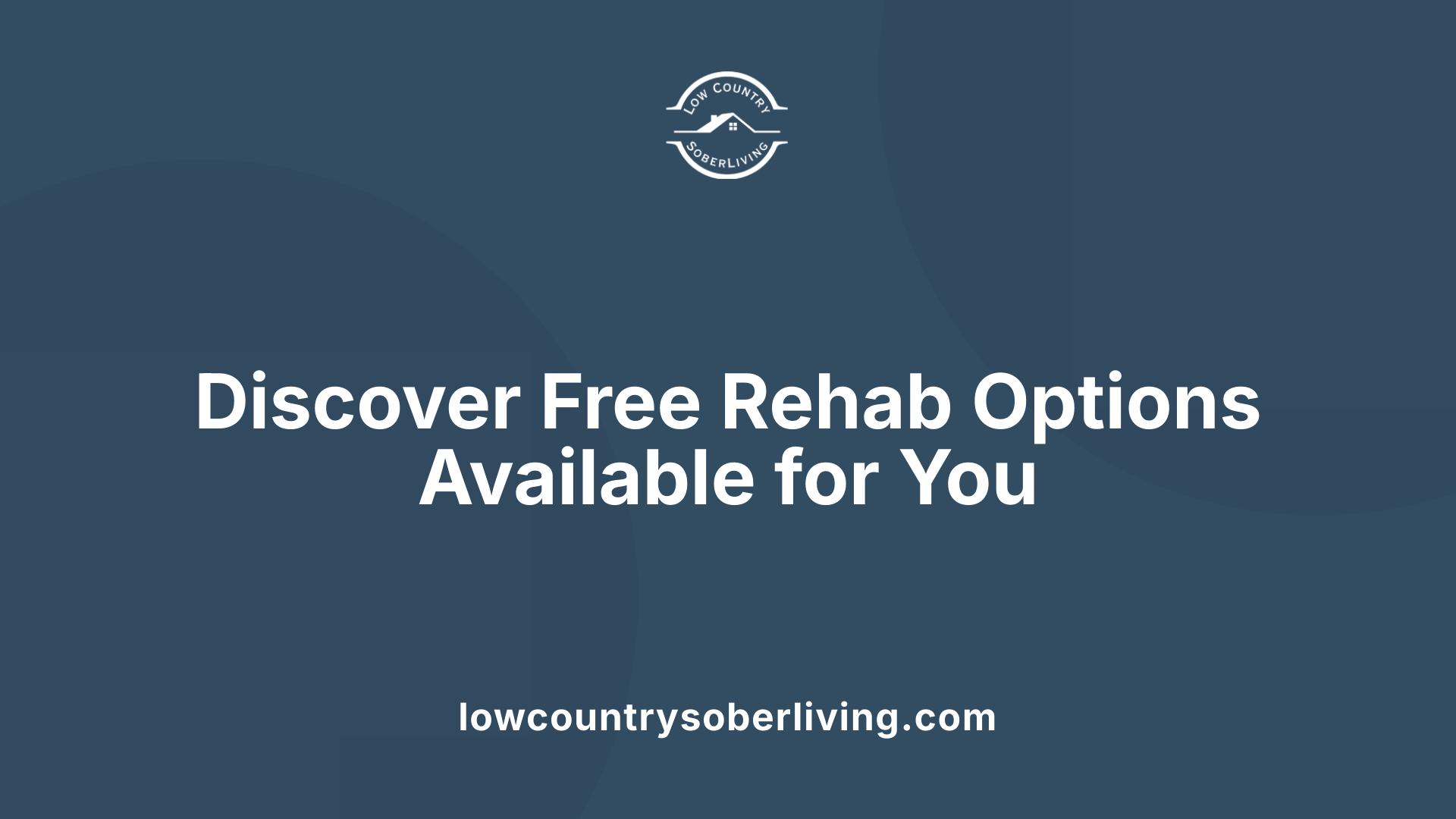
Are there free drug and alcohol rehab services available?
Yes, free drug and alcohol rehab services are accessible through various channels. Many states operate publicly funded centers that deliver treatment at no cost to individuals who lack insurance, have low income, or do not qualify for other programs. Faith-based organizations like the Salvation Army and Harbor Light offer free outpatient and inpatient treatment options rooted in spiritual guidance.
Nonprofit groups and community organizations also run free programs to support those struggling with addiction. The Substance Abuse and Mental Health Services Administration (SAMHSA) provides a toll-free helpline (1-800-662-HELP), offering confidential referrals to nearby free or low-cost treatment facilities and support groups.
Veterans can benefit from VA programs that cover substance use disorder treatment, often at no charge, especially if the treatment is related to service-connected issues. These efforts aim to eliminate financial hurdles, making recovery accessible for everyone in need.
Overall, numerous resources, government grants, donations, and charity efforts make free rehab an achievable option for many individuals facing addiction challenges.
Cost Comparisons Between Paid and Free Rehab Options
What are the average costs for inpatient and outpatient rehab?
Inpatient rehab programs typically cost around $6,000 for a 30-day stay, but this can go up to $20,000 or more in well-known centers. Longer stays of 60 or 90 days can range from $12,000 to $60,000, depending on the facility and amenities.
Outpatient rehab, which is suitable for mild to moderate addictions, usually costs about $5,000 for a three-month program. Some outpatient options can cost up to $10,000.
Detox services, often part of inpatient or outpatient programs, range from $1,000 to $1,500 for outpatient detox, while inpatient detox costs are included in the overall rehab expenses.
How do free rehab options compare?
Free treatment options are typically funded by government grants, charities, and community organizations. These programs often include inpatient, outpatient, detox, and medication-assisted treatments at no cost.
While free programs might not have the luxury amenities of some paid centers, they provide essential services, especially for those with limited financial resources.
Many free or low-cost centers work on a sliding fee scale or offer scholarships based on income, ensuring accessible treatment for more individuals.
To explore available options, resources like SAMHSA's locator tools and community-based organizations can help locate free rehab centers.
Why is the cost of rehab worth the investment?
Given the high costs related to ongoing addiction—such as health issues, legal problems, and lost productivity—the expense of treatment is often justified. Effective rehab can lead to long-term savings and improved quality of life, reducing the overall financial burden of addiction.
This comparison highlights that while inpatient rehab can be costly, free and subsidized options are available to ensure everyone has access to necessary treatment.
Conclusion: Accessing Help Without Financial Barriers
Importance of recognizing available free resources
Many people struggling with addiction are unaware that free treatment options exist. Government-funded programs, charities, religious organizations, and community health centers offer treatment at no cost or for a minimal fee. Resources like SAMHSA’s National Helpline and FindTreatment.gov can help locate nearby free or low-cost services. These programs are crucial for those without insurance, limited income, or facing financial hardship.
How to navigate eligibility and enrollment
Eligibility criteria vary by program but typically include proof of income, residence, and addiction severity. Some centers prioritize populations such as veterans, pregnant women, or low-income individuals. To enroll, applicants often need medical records, identification, and proof of income. Many programs also work with sliding fee scales and scholarships to minimize costs. It’s essential to contact local providers directly or use online tools to confirm eligibility and understand the specific application process. With proper guidance, accessing free treatment is achievable, providing vital support for recovery without the burden of financial hardship.
Empowering Your Journey Toward Recovery
While the cost of rehab can seem daunting, a wealth of free and low-cost options exist nationwide to support individuals in overcoming addiction. By understanding eligibility criteria, utilizing available resources such as SAMHSA’s helpline, and exploring government-funded and nonprofit programs, those seeking help can find effective treatment that fits their financial situation. Remember, recovery is accessible to everyone, regardless of financial means — help is available, and your path to sobriety can be free.
References
- National Helpline for Mental Health, Drug, Alcohol Issues - SAMHSA
- Free Drug and Alcohol Rehab Centers: Find Free Rehab Near Me
- Free Drug and Alcohol Addiction Treatment Options - Rehabs.com
- Cost Of Drug And Alcohol Rehab - Addiction Center
- Free Drug & Alcohol Rehab Centers Near Kansas City
- Free Drug Rehab Options Near Me - Orlando Recovery Center
- Free Drug & Alcohol Rehab for Veterans - veteranaddiction.org

